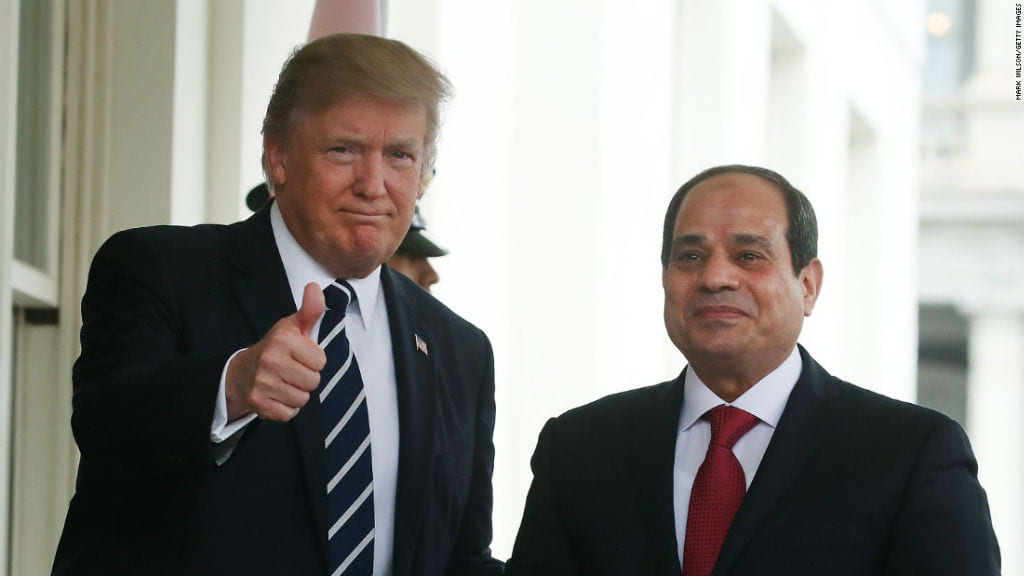BY KATHLEEN MURPHY – STAFF WRITER
After twin suicide bombings on Coptic Churches on the important Christian holy day of Palm Sunday in Egypt, American president, Donald Trump, called Egyptian president, Abdel Fattah el-Sisi to express his condolences. While such exchanges among world leaders after tragedies are usually common, the sentiments expressed went beyond polite sympathies, reinforced by el-Sisi’s first visit to the White House a week earlier, indicating a possible change in U.S. relations with his government. Although the Trump Administration may see this as overdue shoring up of bilateral relations with a possibly strategic ally, especially in the fight against ISIS, it is likely these two governments want more of each other than they are willing to offer in return.
While such warmth of Trump and el-Sisi’s relationship goes as far back as Trump’s nomination, similar warmth between the U.S. and Egypt is rather new. Under the previous U.S. administration, the White House refused to invite el-Sisi for a state visit, citing his record of human rights abuses as a general and wavering on the nature of his ascent to power. At one point, the Obama Administration even suspended most military aid to Egypt, citing the military’s violent removal of former President Mohamed Morsy, although stepping short of calling it a coup.
Despite only the beginnings of change, the administration’s move suggests it hopes for a more positive and accepting future relationship with Egypt, a view that el-Sisi may share. Yet, as these two leaders and their governments sit in very different contexts, they likely have very different visions for that desired constructive relationship.
Currently facing a fierce battle against an ISIS affiliate in the Sinai, Egypt’s government likely appreciates the Trump Administration’s hard-line stance against the terrorist organization, reflected in its recent use of a Massive Ordnance Air Blast against ISIS’s Afghani affiliate, Khorasan Province. Trump likely sees el-Sisi authoritarian and military leadership as incredibly effective and reliable against groups like ISIS, visible in the Egyptian efforts to combat the Sinai affiliate.
However, Trump’s desire to pull together a regional coalition against the terrorist group may fall short when it comes to Egypt. The government has reluctantly provided the minimum number of troops for a Saudi-led coalition in Yemen, slowly and hesitantly extending their mandates. Consequently, Egypt’s government will likely disappoint in its military contributions to the fight against ISIS as it has in for Saudi Arabia in the fight against the Houthis. Moreover, Egypt faces the effects of instability in its neighbor Libya to the west and Sudan in the south and the drain of conflict with ISIS in the east. The government may therefore feel unable to increase contribution to conflicts elsewhere while others closer to home pose greater threats to its sovereignty. In contrast to Trump’s expectations, he may find an Egyptian government making more demands of the U.S., especially for increased military aid, rather than a country willing, or even able, to offer more.
El-Sisi too may find his hopes dashed due to the Trump Administration’s pay-to-play attitude concerning security operations with its allies. As Trump insisted throughout his campaign and continues to do so (although perhaps a little quieter), he believes that U.S. allies must pay for U.S. military protection or contribute more to their alliance. He singled out NATO specifically; questioning the existence of the organization, especially as the U.S. contributes the lion’s share of the forces and financing for the collective security arrangement and most countries contribute under the minimum requirement. Applying this to Egypt, the administration may resent the idea of picking up another ally that does not pull its weight, worrying about cost and the development of dependency. Egypt may quickly find itself falling to the wayside as the Trump Administration moves onto a country of focus.
Relatively speaking though, only the appearance and friendliness of the relationship has changed. Centre College’s Dr. Dina Badie explains that between the Obama and Trump Administrations, only the optics have changed while the underlying mechanics, such as military and developmental aid, remain the same. She notes how former President Obama attempted to carefully balance his responses to developments in Egypt. He rhetorically encouraged the democratic process even as the Muslim Brotherhood’s political party, which has less than friendly interactions with the U.S., won the elections. When el-Sisi seized power, he struggled with whether to define the move as a coup and the possible consequences of this label. President Trump’s attitude, on the other hand, makes him considerably less cautious, more easily embracing leaders like el-Sisi with questionable political and human rights histories.
Consequently, the U.S. and Egypt will likely continue their existing relationship, coming to a standstill regarding changes that would require each to give more for the other. President Trump, however, will more openly and publically comment on the closeness of U.S.-Egyptian relations, perhaps making his customarily unpredictable comments on Twitter or elsewhere. Unlike his predecessor, he will let human rights hesitations fall to the wayside, unconcerned about appeasing human rights interest groups. The careful public relations footwork required in negotiating the U.S.-Egyptian relationship while simultaneously appealing to human rights may require more nuance than the administration has a capacity for.

